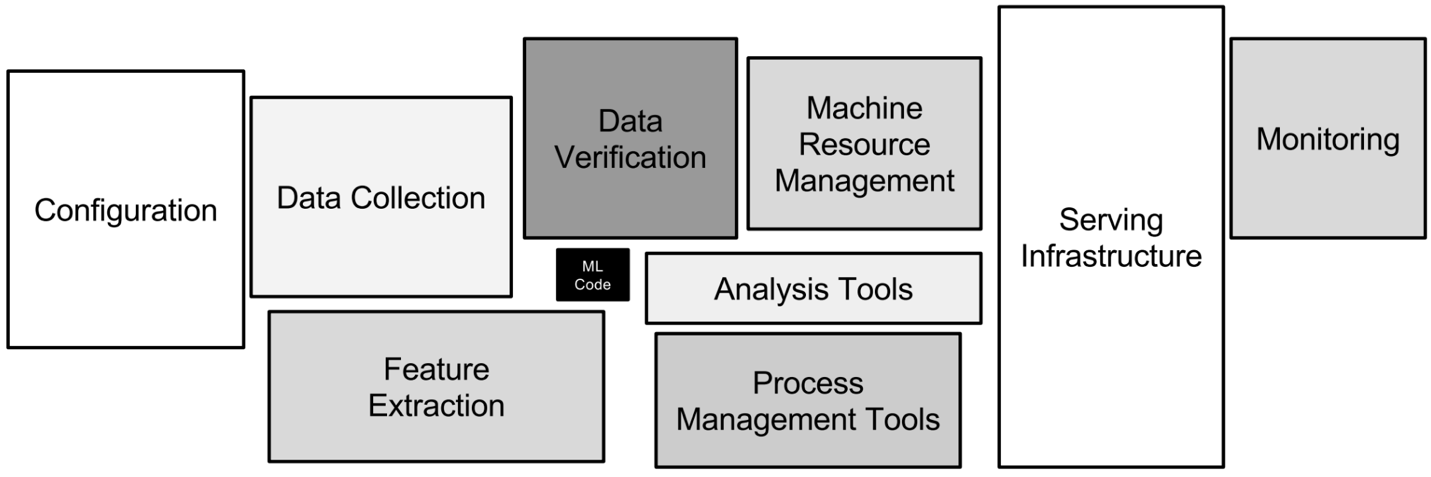What is MLOps?
In 2015, Google released a research paper titled “Hidden Technical Debt in Machine Learning Systems”. In this paper, Sculley et al. highlighted how coding predictive machine learning models is a small fraction of building, deploying, and maintaining machine learning systems in production. The paper sent shockwaves throughout the field and has been since validated through countless instances of data scientists struggling to deploy their models in production.

The exciting new category of MLOps (Machine Learning Operations) has emerged over the past few years with the aim of solving the deployment challenges data teams face. MLOps, or Machine Learning Operations, is a set of tools, practices, techniques, and culture that ensure reliable and scalable deployment of machine learning systems. As data science matures as a field, MLOps is one of the most, if not the most, fastest-growing specializations that data scientists can choose.
Given how nascent a field MLOps is, there aren’t many codified learning paths. Regardless, the open-source and machine learning communities have provided a wide plethora of free resources anyone can tap into that are incredibly reliable and immediately useful. Here are 10 free resources you can start today to start your MLOps learning journey.
1. MLOps Fundamentals Skill Track
DataCamp's skill track, MLOps Fundamentals, covers the complete life-cycle of a machine learning application, ranging from the gathering of business requirements to the design, development, deployment, operation, and maintenance stages. This track includes conceptual courses designed to help you expand your data science knowledge into the world of production machine learning software! Upon completion of the track, you'll be equipped with an MLOps mindset and will be deeply familiar with concepts such as CI/CD and CM/CT, experiment tracking, model registries, feature stores, and different deployment strategie
2. Machine Learning Engineering by Andriy Burkov
Originally released in 2020, this book is one of the few that cover the fundamentals of applied machine learning. Instead of focusing on any tool or concept, Burkov breaks down the art and science of building and deploying an end-to-end machine learning project. Throughout the book, he highlights the most common challenges data teams face when deploying machine learning models in production and their solutions.
You can access the book for free as it follows a “read first, buy later” principle—meaning you can read it and pay after if you have received value from it.
3. ML in Production Blog
Some of the best resources on MLOps can be found in newsletters and blogs of active data scientists today. Luigi Patruno’s ML in Production Blog and Newsletter are the best examples of this. He regularly shares insightful content around deploying and maintaining models in production. Here’s how he describes his approach to curation:
- Applied—Content is focused on tools, patterns, platforms, and systems that have been proven to work in production.
- Focused on best practices—Data science and machine learning are rapidly changing fields. There’s a shortage of people with the necessary skills to deploy these systems and a lack of established best practices. The newsletter aims to curate these best practices to the broader community.
- Aimed at making data scientists more effective at their jobs—All of the content curated aims to help data scientists, ML engineers, and data practitioners gain and improve high-impact, marketable skillsets.
4. MLOps Community
Learning MLOps is best done together and with practice. This is a community of fellow practitioners for you to tune into (or join) and learn from other skilled practitioners in the field. From blogs, videos, and engaging conversations, this resource is a great way to establish your footing in this space.
5. Full Stack Deep Learning
This course provides some of the highest quality content in learning how to take complex, large models into production. It’s not only taught by reputed professors like Engineers and Scientists from OpenAI and Stanford, but you can also find guest lectures from leaders leading some of the most inspiring machine learning companies today like Tesla’s Andrej Karpathy.
This course teaches a full-stack approach to deep learning including
- Formulating the problem and estimating project cost
- Finding, cleaning, labeling, and augmenting data
- Picking the right framework and compute infrastructure
- Troubleshooting training and ensuring reproducibility
- Deploying models into production
6. Made With ML by Goku Mohandas
Goku Mohandas has created a phenomenal and open course on building end-to-end machine learning systems. Made with ML is one of the top repositories on GitHub, and more than 30K+ people are taking his course.
Lessons across Made with ML cover the basics of machine learning to the ins and outs of deploying, testing, and monitoring models in production. Goku’s lessons cover the intuition behind the concepts introduced, provide hands-on project-based assignments, and provide learners with some of the software engineering best practices needed to succeed in an MLOps role.
7. Awesome production machine learning
This heavily curated GitHub repository is for those looking to just dive right into packages, libraries, and cutting-edge tools to practice for themselves. All of the listed packages and tools are designed to help you build, deploy, monitor, version, scale, and secure your production machine learning systems.
Whether data labeling, model training orchestration, explainability, serving, monitoring, and more—there are definitely at least a few packages here to start experimenting within your projects. They also feature The ML Engineer newsletter that keeps you up-to-date with the latest frameworks, tutorials, and articles curated by machine learning practitioners.
8. MLOps Tutorial by DVC
DVC (Data Version Control) is an open-source version control system for machine learning projects. DVC extends Git version control to datasets and models. Moreover, the same team behind DVC also developed Continuous Machine Learning (CML), a tool for adapting continuous integration systems like GitHub Actions & GitLab CI for machine learning.
This relatively short YouTube series highlights important concepts at the intersection of DevOps and Machine Learning. It balances theory and practice effectively and shows you how to apply data versioning via DVC.
9. Machine Learning Operations
This resource is arguably one of the most comprehensive. It’s riddled with posts that break down the different elements of a successful MLOps practice. Machine Learning Operations presents guidelines, frameworks, codes of conduct, and attempts to set the standard on MLOps.
Although short, this is a great starting point that articulates why MLOps is important, the key principles of a successful MLOps practice, the tools and frameworks used in MLOps, and more.
10. MLOps – Machine Learning Operations by AIEngineering
AIEngineering is probably one of the best, if not the best YouTube channel for applied machine learning. With over 60k subscribers, Srivatsan Srinivasan has built a following by discussing all things data.
He has tons of in-depth videos and playlists on MLOps and deploying end-to-end machine learning projects. Make sure to check it out.
11. ML Engineering for Production ML Deployments with TFX by TensorFlow
Google has built one of the most widely used tools in machine learning with TensorFlow. They take it to another level with TensorFlow Extended (TFX). TensorFlow Extended is an end-to-end platform for deploying machine learning models. It is composed of various packages for data validation, transformation, model analysis, and more. TFX is built to easily design machine learning systems without spending absurd amounts of time and effort in software engineering work.
This YouTube playlist is led by Google Developer Advocate Robert Crowe and introduces you to key MLOps concepts and best practices used at Google. Furthermore, the TFX documentation is a wonderful read to explore as well—just attempting to use that package with their guides can teach you a significant amount.
Learn more about MLOps
While MLOps is still in its early stages—there’s a lot of value in getting a headstart on the latest best practices and tools covered in the resources above. If you’re interested in learning more about MLOps, you can also check out the following resources:
